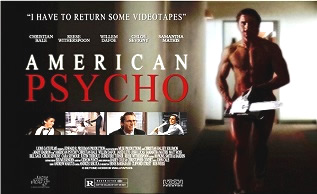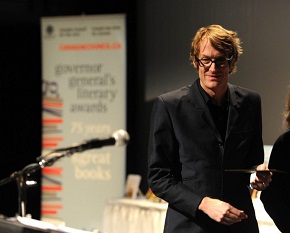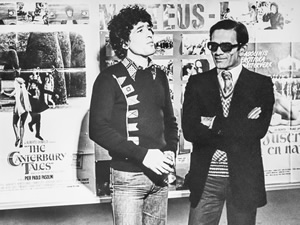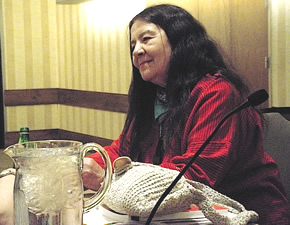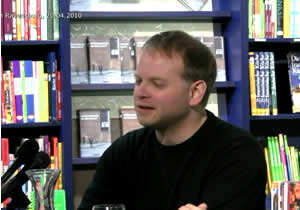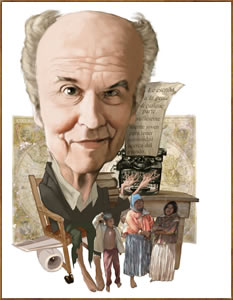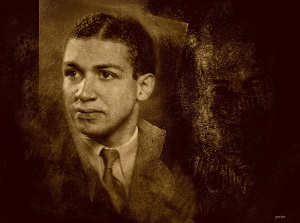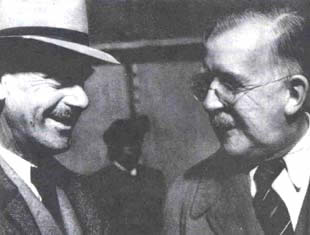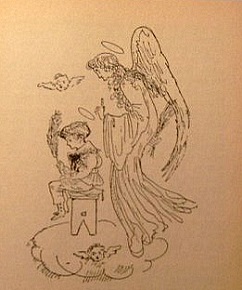De Surinaamse schrijfster Cándani werd geboren in District Suriname op 8 maart 1965. Cándani betekent in het Sarnami: “Esthetica van de maan”. Vanaf 1982 tot 2007 was Cándani het pseudoniem van Asha van den Bosch-Radjkoemar. Cándani debuteerde in 1990 met een dichtbundel in het Sarnami en het Nederlands: “Ghunghru tut gail/De rinkelband is gebroken” in 1990. De bundel werd uitgebracht door de Volksboekwinkel (Paramaribo) en het NBLC (Den Haag) en de auteur kwam voor de presentatie naar Nederland. Zij ging niet meer terug naar haar geboorteland vanwege de familieomstandigheden daar. Zij was als illegaal in Nederland en kwam terecht bij Scientology. Wel ging zij door met publiceren. Na Cándani’s debuutbundel volgden haar eveneens tweetalige bundel “Ghar ghar ke khel/Het spel van huisje huisje” (2002) en de Nederlandstalige bundels “Vanwaar je dacht te vertrekken sta je geplant” (1993), “Zal ik terugkeren als je bruid” (1999) en “Een zoetwaterlied” (2000). Zij schreef ook twee romans, “Oude onbekenden” (2001) en “Huis van as” (2002) waarin de zoektocht naar het verleden en het antwoord op de vraag wie-ben-ik geplaatst wordt binnen de historische context van de hindostaanse migratie en hermigratie naar Nederland. “Geef mij het land dat in jou woont” (2004) is een historische dichtbundel over de geschiedenis van Suriname. Na jarenlang stilzwijgen trad zij in juni 2013 weer naar buiten, nu met schilderijen die zij maakt onder de naam Saya D.L. Amores.
Uit: Relaas voor S.
“Je kijkt naar de planken muren zonder iets te zien. Je praat zonder je eigen stem te horen. Jij beseft onze realiteit en denkt dat ik niets begrijp. Maar ik begrijp jou, je vraagt naar de man die geen vaderschap over jou verdient. Je wilt veel weten. Vol verwachting kijk je naar mij op alsof ik je een sprookje ga vertellen. Ik wil het wel maar kan het niet. Het valt buiten ons boek.
Het leven gaat langzaam. Ik weet me geen raad in dit kleine huis. Ik heb geen kracht om wat te doen. Het vaatwerk wacht op mij. Mijn boeken en schriften liggen overal. Ik heb geen eetlust; jij dwingt me om te eten. Zèlf wilde je kerrie-ei en ik kan je niets weigeren. Na het eten blijf je op mijn schoot spelen. Na vijf minuten zet ik je in bed. Nu slaap je.
Ik ga terug naar de keuken, zak op een stoel naast de door mij in elkaar gespijkerde tafel. Het vieze, kleine hok staart naar mij. Ik val in slaap, maar na een uur maken mijn vrienden, de muskieten, mij wakker. De ramen staan nog open, de stroom is uitgevallen. Ik kijk naar de overkant, daar brandt wel licht, dus iemand heeft mijn zekering weggehaald. Morgen naar de ebs om voor tien gulden een nieuwe te halen. In het donker tast ik naar de aansteker en probeer het gas aan te maken. Het lukt niet, de gasbom is dus ook verdwenen. Goed, maar laat die dieven niet in mijn huis komen, ik kap ze aan stukken.
Gisteravond voelde ik me beroerd. Telkens schrok ik wakker. Wat heb ik misdaan? Ik ben bang. Alsof de dood mij elk moment wil versieren. Ik wil niet dood. Niet nu. Van jou maak ik een geëmancipeerde, zelfstandige vrouw. Mijn maag was opgezwollen van de zenuwen, maar omdat de bussen staakten kon ik niet direct naar de dokter.
Vanochtend vroeg heb ik je gewassen en gekleed. We zijn samen naar de dokter geweest. Ik wist niet waar ik moest kijken in de kale behandelkamer. Je zeurde en zat overal aan. Er lag een bloeddrukmeter. Hé, dacht ik, ik moet mijn kindertijd inhalen. Ik pakte het apparaat, draaide het stoffen gedeelte om mijn arm en pompte het op. Plotseling kwam de dokter binnen.
‘Hallo meisje’, zei hij, wat doe je?’ Hij is heel jong.
‘Dokter’, viel ik met de deur in huis, ‘ik heb altijd ’t idee gehad dat u oud was.’ ‘Waarom?’ vroeg hij.
‘Omdat u zo’n groot huis hebt. Vanwaar hebt u het geld gediekt?’
‘O, dat heb ik gestolen’, zei hij en hij lachte. ‘Wat scheelt je?’
Toen ik wegging – de arts schreef me kalmeringstabletten voor – vroeg ik: ‘Dokter, u zei dat ik een man moet nemen, heeft u broers?’
‘Ja’, zei hij.
‘Goed, stuur ze dan maar, ik zal met ze trouwen.’
‘Maar ze zijn allemaal ouder dan ik en ze wonen in Nederland.’ Van ergens dook een assistente op.”
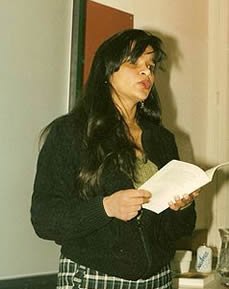
Cándani (District Suriname, 8 maart 1965)
In 1992

